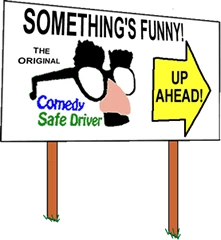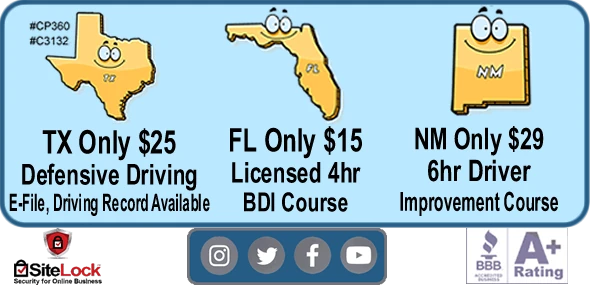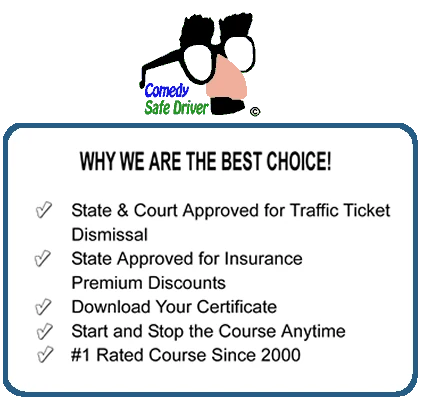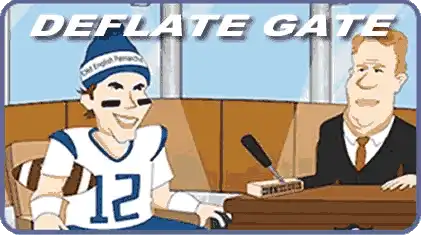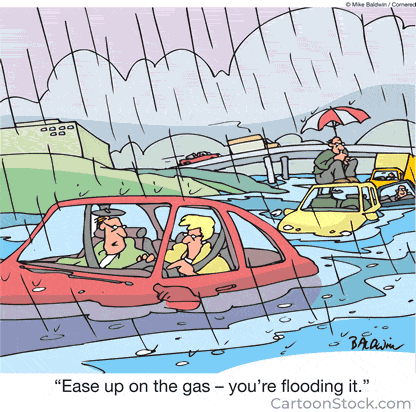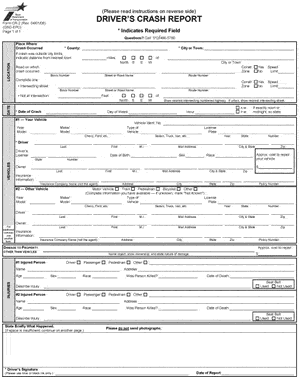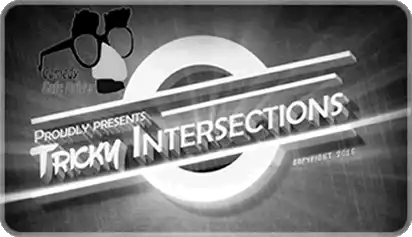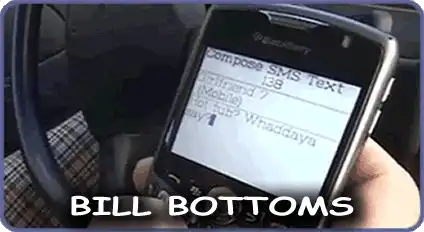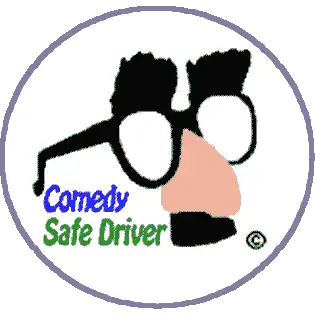Collisions - Class Comedy
Welcome to Comedy Safe Driver's Defensive Driving Course
Driving is a serious responsibility. But who says we can't have a little fun while learning? Welcome to Comedy Safe Driver, where we believe that laughter is the best teacher. Our Collisions Class Comedy provides an engaging and entertaining way to understand the repercussions of road collisions and how to avoid them.
After a collision, here's what to do:
-
-
Assess your injuries and the injuries of others: First and foremost, in the event of an accident or collision, it is of utmost importance to promptly and diligently assess and ascertain, without delay, whether you, the driver, or any of the passengers accompanying you within the confines of your vehicle have sustained any form of bodily harm, injury, or distress, for the sake of their well-being and the necessity of timely medical attention and care. In addition, if you find yourself capable and physically able to do so, it is strongly advised and recommended to extend your assessment and evaluation to include the occupants of the other involved vehicle(s), as their safety and welfare are equally significant and warrant thorough consideration. Furthermore, it is crucial to exercise caution and exercise the utmost discretion, particularly when dealing with individuals who display signs or indications of severe and potentially life-threatening injuries, refraining from any hasty or reckless movements or actions that could exacerbate their condition, unless and only if it becomes absolutely imperative and indispensable in order to ensure their preservation and safeguarding from any further harm or jeopardy.
-
Move to a safe location if possible: In the event that the collision you have experienced is determined to be of a minor nature, whereby the functionality and operability of your vehicle remain intact and unaffected, it is advisable and prudent to promptly and expediently relocate said vehicle away from the immediate flow of traffic, taking all necessary precautions and ensuring the utmost consideration for your safety as well as that of other road users. Such relocation may encompass a variety of viable options, including but not limited to, the utilization of available spaces such as the designated shoulder of the road, a conveniently located nearby parking lot, or any other area that is deemed secure, unhindered, and within close proximity. Moreover, it is essential to activate your vehicle's hazard lights, thereby actively signaling and alerting fellow motorists to exercise heightened caution and awareness while passing or approaching your vehicle. Conversely, in the unfortunate circumstance that the accident you have encountered is characterized by its severity and magnitude, it may be deemed more appropriate and judicious to maintain the current positions and placements of the involved vehicles, refraining from any attempts to move or reposition them until such time as law enforcement personnel arrive at the scene, as their expertise, guidance, and enforcement of necessary protocols are paramount in ensuring a comprehensive and thorough investigation of the incident, as well as facilitating an optimal and unbiased resolution to the situation at hand.
-
Contact the authorities: Regardless of the severity of the accident, it's essential to contact the police. They'll create a legal accident report, which can be crucial for your insurance claim. If the collision resulted in serious injuries, you should also call an ambulance.
-
Document the accident and gather information: Use your smartphone to take pictures of the accident scene, including damage to all vehicles involved, the positioning of the vehicles, any skid marks, and the overall road conditions. Exchange information with the other driver(s) involved in the collision, including names, addresses, phone numbers, driver's license numbers, and insurance information. If there are any witnesses, get their contact details as well.
-
Inform your insurance company: As soon as possible, inform your insurance company about the accident. Be honest and provide all the necessary details. They will guide you through their specific process for filing a claim. Your insurer will then begin the process of investigating the accident and, if covered by your policy, start the process of repairing your vehicle.
-
Seek medical attention: Even if you don't think you've been injured, it's a good idea to seek medical attention after a collision. Some injuries, like whiplash or a concussion, might not become apparent until hours or even days after the accident. A timely medical evaluation can also be helpful in documenting any injuries related to the accident for insurance or legal purposes.
Remember, every accident is different, and these steps might not all apply to your situation. The most important thing is to ensure the safety and well-being of all people involved.
-
Understanding how to prevent collisions is crucial. Here are some tips:
-
-
Always stay focused and avoid distractions while driving: Distracted driving is a leading cause of accidents. This includes using a cell phone, eating, reading, grooming, or even adjusting the radio. It's vital to keep your full attention on the road. If you need to do something that could potentially distract you, it's best to pull over safely before doing so.
-
Follow all traffic laws, including speed limits: Adhering to posted speed limits, yielding the right of way, obeying traffic signs and signals, and following all other traffic laws are crucial for preventing accidents. Speeding not only increases the likelihood of an accident but also can result in more severe injuries. Remember that traffic laws are designed to protect all road users, including drivers, passengers, pedestrians, and cyclists.
-
Keep a safe distance from the vehicle in front of you: This is often referred to as the "three-second rule." Basically, when the vehicle ahead of you passes a certain point, such as a sign, count "one thousand one, one thousand two, one thousand three." This counting measures the time you're behind the other car. If you pass the point before you finish counting, you're following too closely. In bad weather conditions, it's advisable to increase this to a six-second gap.
-
Maintain your vehicle to ensure it's in good working condition: Regular vehicle maintenance can prevent many of the issues that lead to accidents. This includes routine checks and services such as tire pressure and tread depth checks, brake inspections, fluid level checks, and ensuring lights and signals are working properly. Regular maintenance can not only prevent an accident but also increase the lifespan of your vehicle.
-
Never drive under the influence of alcohol or drugs: This is one of the most critical rules of driving. Not only is it illegal, but driving under the influence dramatically increases your risk of getting into a collision. It impairs your ability to operate the vehicle safely, affecting your judgment, coordination, and reaction times. Always designate a sober driver, use a rideshare service, or stay overnight if you've been drinking or using drugs.
In addition to these, defensive driving can significantly reduce the risk of collisions. This involves being aware of your surroundings, anticipating potential hazards, and reacting accordingly to prevent an accident. Defensive driving courses are available and can often lead to insurance discounts.
-
When to File a Collision Report
According to the Texas Department of Transportation, if a law enforcement officer is not investigating the crash, you must file a crash report with TxDOT within 10 days if:
-
-
Filing a crash report: If a law enforcement officer does not investigate the crash, you have the responsibility to report it to the Texas Department of Transportation (TxDOT) within ten days under the following circumstances:
- If there are any injuries or a fatality as a result of the crash.
- If you suspect the property damage from the crash exceeds $1,000. This could include damage to vehicles, roadside property, or any other property involved in the crash.
- If you suspect a driver involved in the crash is intoxicated, unlicensed, has no insurance, or attempts to leave the scene of the crash. These are all serious offenses, and it's important to report them to ensure appropriate legal action can be taken.
-
Penalties for not filing a report: If you do not file a crash report when required to do so, you could be subject to a fine of up to $500, plus additional court costs. These penalties are designed to encourage drivers to report crashes promptly and accurately, which aids in the enforcement of traffic laws and the administration of insurance claims.
-
Obtaining a copy of the crash report: You can download a copy of the crash report from the Texas Department of Transportation's website at http://www.dot.state.tx.us/services/traffic_operations/crash_reports.htm. This form will guide you through the process of documenting the details of the crash. Alternatively, you can visit one of the TxDOT local offices to obtain a copy of the report.
When completing the crash report, it's important to provide as much detail as possible. This includes information about the drivers, vehicles, and conditions involved in the crash, as well as a diagram and narrative description of the crash. This report can be a valuable piece of evidence if there are any legal proceedings or insurance claims related to the crash.
-
With our class, you'll learn all these and more with a twist of humor. Make your learning experience enjoyable and memorable. Sign up for our Collisions Class Comedy today!

